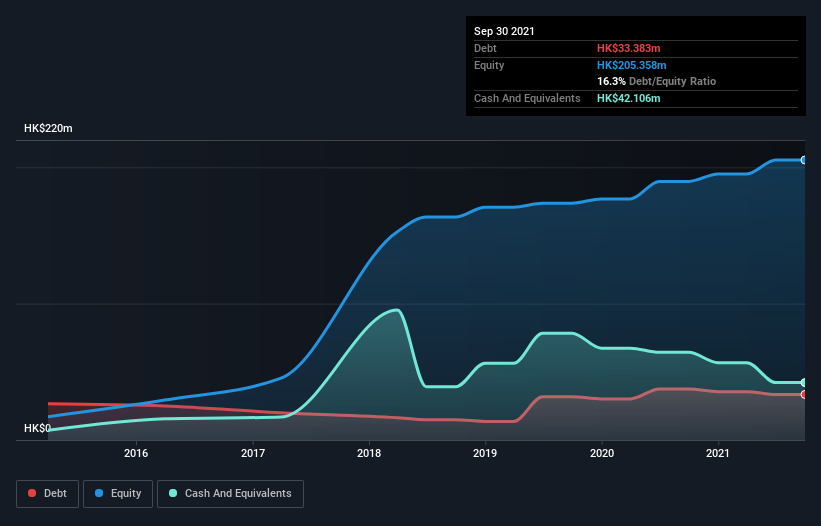- Hong Kong
- /
- Oil and Gas
- /
- SEHK:1621
We Think Vico International Holdings (HKG:1621) Can Manage Its Debt With Ease
The external fund manager backed by Berkshire Hathaway's Charlie Munger, Li Lu, makes no bones about it when he says 'The biggest investment risk is not the volatility of prices, but whether you will suffer a permanent loss of capital.' It's only natural to consider a company's balance sheet when you examine how risky it is, since debt is often involved when a business collapses. We note that Vico International Holdings Limited (HKG:1621) does have debt on its balance sheet. But should shareholders be worried about its use of debt?
What Risk Does Debt Bring?
Generally speaking, debt only becomes a real problem when a company can't easily pay it off, either by raising capital or with its own cash flow. In the worst case scenario, a company can go bankrupt if it cannot pay its creditors. However, a more frequent (but still costly) occurrence is where a company must issue shares at bargain-basement prices, permanently diluting shareholders, just to shore up its balance sheet. By replacing dilution, though, debt can be an extremely good tool for businesses that need capital to invest in growth at high rates of return. When we think about a company's use of debt, we first look at cash and debt together.
Check out our latest analysis for Vico International Holdings
What Is Vico International Holdings's Debt?
You can click the graphic below for the historical numbers, but it shows that Vico International Holdings had HK$33.4m of debt in September 2021, down from HK$37.4m, one year before. But on the other hand it also has HK$42.1m in cash, leading to a HK$8.72m net cash position.

How Strong Is Vico International Holdings' Balance Sheet?
The latest balance sheet data shows that Vico International Holdings had liabilities of HK$46.6m due within a year, and liabilities of HK$4.82m falling due after that. Offsetting this, it had HK$42.1m in cash and HK$55.9m in receivables that were due within 12 months. So it actually has HK$46.5m more liquid assets than total liabilities.
This luscious liquidity implies that Vico International Holdings' balance sheet is sturdy like a giant sequoia tree. On this view, lenders should feel as safe as the beloved of a black-belt karate master. Simply put, the fact that Vico International Holdings has more cash than debt is arguably a good indication that it can manage its debt safely.
Vico International Holdings's EBIT was pretty flat over the last year, but that shouldn't be an issue given the it doesn't have a lot of debt. There's no doubt that we learn most about debt from the balance sheet. But it is Vico International Holdings's earnings that will influence how the balance sheet holds up in the future. So when considering debt, it's definitely worth looking at the earnings trend. Click here for an interactive snapshot.
But our final consideration is also important, because a company cannot pay debt with paper profits; it needs cold hard cash. Vico International Holdings may have net cash on the balance sheet, but it is still interesting to look at how well the business converts its earnings before interest and tax (EBIT) to free cash flow, because that will influence both its need for, and its capacity to manage debt. During the last three years, Vico International Holdings produced sturdy free cash flow equating to 52% of its EBIT, about what we'd expect. This cold hard cash means it can reduce its debt when it wants to.
Summing up
While it is always sensible to investigate a company's debt, in this case Vico International Holdings has HK$8.72m in net cash and a decent-looking balance sheet. So we don't think Vico International Holdings's use of debt is risky. When analysing debt levels, the balance sheet is the obvious place to start. But ultimately, every company can contain risks that exist outside of the balance sheet. For example - Vico International Holdings has 2 warning signs we think you should be aware of.
Of course, if you're the type of investor who prefers buying stocks without the burden of debt, then don't hesitate to discover our exclusive list of net cash growth stocks, today.
New: Manage All Your Stock Portfolios in One Place
We've created the ultimate portfolio companion for stock investors, and it's free.
• Connect an unlimited number of Portfolios and see your total in one currency
• Be alerted to new Warning Signs or Risks via email or mobile
• Track the Fair Value of your stocks
Have feedback on this article? Concerned about the content? Get in touch with us directly. Alternatively, email editorial-team (at) simplywallst.com.
This article by Simply Wall St is general in nature. We provide commentary based on historical data and analyst forecasts only using an unbiased methodology and our articles are not intended to be financial advice. It does not constitute a recommendation to buy or sell any stock, and does not take account of your objectives, or your financial situation. We aim to bring you long-term focused analysis driven by fundamental data. Note that our analysis may not factor in the latest price-sensitive company announcements or qualitative material. Simply Wall St has no position in any stocks mentioned.
About SEHK:1621
Vico International Holdings
An investment holding company, engages in the distribution of lubricants and petrochemicals in Hong Kong, Vietnam, Dubai, Thailand, Singapore, and India.
Flawless balance sheet and slightly overvalued.
Market Insights
Community Narratives



